PRINCETON, NJ -- If North Korea were to attack South Korea, as increasingly seems to be a possibility with the recent threats and actions of North Korean leaders, the majority of Americans (55%) say the United States should use its military forces to help defend the South, while 34% say the U.S. should not do so.
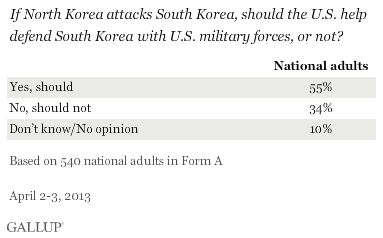
The U.S. has provided military protection for and has maintained a military presence in South Korea continuously since the end of the Korean War in the early 1950s. This continuing military connection between the U.S. and South Korea may be part of the reason behind the majority support for U.S. help in defending South Korea in the April 2-3 Gallup Daily tracking survey.
The possibility of North Korean attacks against South Korea or the United States has increased as North Korean leaders engage in bellicose statements and threats, including movement of troops and missiles, and reports of North Korea claiming that it could strike the United States with "cutting edge" nuclear weapons.
Some 63 years ago, North Korea did attack South Korea, precipitating the Korean War, and these actions thus stand as a reminder of what is possible. Still, it is difficult for even the most accomplished diplomatic observers to say with certainty what North Korea is or is not likely to do in the future. This uncertainty is mirrored in the American public's views -- 43% say it is likely and 44% say it is not likely that North Korea will attack South Korea in the next six months.
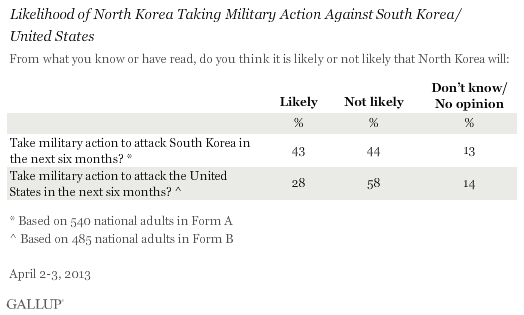
Relatively few Americans -- 28% -- think it is likely that North Korea will attack the United States in the next six months. It is not clear that North Korea is capable of attacking the U.S. mainland with missiles, but there is an increasing focus on the possibility of attacks on U.S. military forces stationed in the Pacific. As a result, the U.S. is rapidly moving a missile defense system to the U.S. possession of Guam in the Pacific Ocean.
About seven in 10 Americans say they are very or somewhat closely following the news about North Korea's recent threats against South Korea and the United States, modestly above the average of 61% who have closely followed a list of more than 200 news stories Gallup has measured over the last several decades.
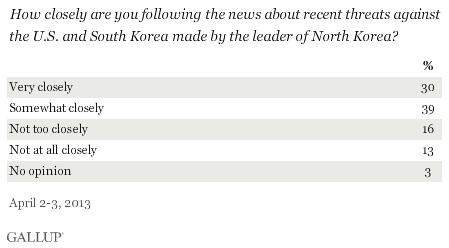
Those who are closely following the news about North Korea's threats are about evenly divided in their views of the likelihood of North Korea attacking South Korea, with 50% saying it is likely and 46% saying it is not. Those not closely following the news tilt toward saying it is unlikely, but with a significantly higher "don't know" percentage.
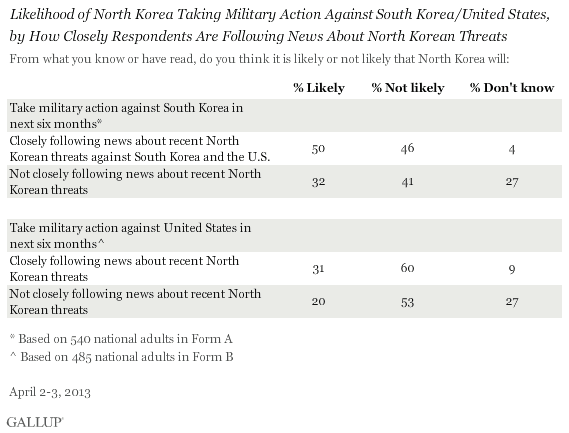
Americans' views on the possibility of North Korea attacking the U.S. are tilted substantially toward the "unlikely" side of the scale among those who are following the news closely and among those who are not doing so.
Those closely following the news of North Korea say the U.S. should help defend South Korea, by 66% to 27%, while those not closely following the news tilt toward saying the U.S. should not come to South Korea's aid, by 48% to 37%. This large difference suggests that if more Americans begin to pay close attention to the North Korean situation in the days ahead, the level of support for U.S. intervention in the event of an attack against South Korea may increase.
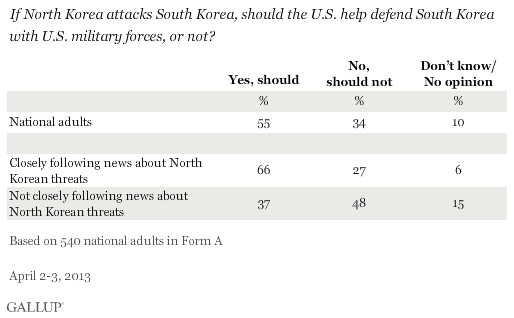
Sixty-five percent of Americans aged 65 and older say the U.S. should come to the aid of South Korea if that country is attacked by the North, significantly higher than the percentage among those who are younger. These older Americans are most likely to remember the Korean War, which may affect their views on the matter. There is relatively little difference between Republicans' and Democrats' views on this issue, with independents slightly more likely to say the U.S. should not go to the aid of South Korea.
Implications
The history of the Korean Peninsula since World War II has been one of division and tensions. The North Koreans attacked the South with military forces in 1950, and in that instance the U.S. immediately came to the South's aid, leading to the Korean War, which ultimately resulted in more than 30,000 U.S. deaths.
The years since the Korean War have been punctuated with skirmishes and small numbers of casualties, but in recent weeks the possibility of a more dramatic resurgence of military action has become pronounced as North Korean leaders have adopted an increasingly militaristic public posture.
Average Americans have no real way of judging the actual probability of a North Korean attack on the South or on the U.S., but based on the knowledge they do have, the public is split down the middle on whether an attack on South Korea is likely. Fewer think that an attack on the U.S. is likely. Still, a majority of Americans, particularly those who are following the news of this situation on the Korean peninsula closely, say the U.S. should come to the aid of South Korea if that country is attacked by the North -- just as the U.S. did in 1950.
Survey Methods
Results are based on telephone interviews with 1,025 national adults, aged 18 and older, conducted April 2-3, 2013.
For results based on the total sample of national adults, one can say with 95% confidence that the margin of error is ±4 percentage points.
For results based on the sample of 540 national adults in Form A and 485 national adults in Form B, the margins of sampling error are ±6 percentage points.
Interviews are conducted with respondents on landline telephones and cellular phones, with interviews conducted in Spanish for respondents who are primarily Spanish-speaking. Each sample of national adults includes a minimum quota of 50% cellphone respondents and 50% landline respondents, with additional minimum quotas by region. Landline telephone numbers are chosen at random among listed telephone numbers. Cellphone numbers are selected using random digit dial methods. Landline respondents are chosen at random within each household on the basis of which member had the most recent birthday.
Samples are weighted to correct for unequal selection probability, nonresponse, and double coverage of landline and cell users in the two sampling frames. They are also weighted to match the national demographics of gender, age, race, Hispanic ethnicity, education, region, population density, and phone status (cellphone only/landline only/both, cellphone mostly, and having an unlisted landline number). Demographic weighting targets are based on the March 2012 Current Population Survey figures for the aged 18 and older U.S. population. Phone status targets are based on the July-December 2011 National Health Interview Survey. Population density targets are based on the 2010 census. All reported margins of sampling error include the computed design effects for weighting.
In addition to sampling error, question wording and practical difficulties in conducting surveys can introduce error or bias into the findings of public opinion polls.
View methodology, full question results, and trend data.
For more details on Gallup's polling methodology, visit www.gallup.com.
